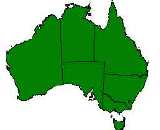
The Uniting Church in Australia has vowed to fight for the abolition of the nation’s recently introduced citizenship test, saying that it is not relevant and it appears that the main purpose "is to assess competence in English".
The test was introduced in November during the last days of the government led by John Howard, who headed a right-of-centre coalition.
The Uniting Church in Australia has said it would urge the newly elected centre-left Labor Party government to discontinue the test.
"The test is redundant, trivial and excluding," said Elenie Poulos, the Uniting Church’s national director for social justice.
Initiated in the weeks prior to a national election, the Howard government said the computer-based exam would "help migrants integrate and maximise the opportunities available to them in Australia".
But a Uniting Church report found the test trivialised citizenship, emphasised a particular conservative view of history, including a virtual disregard for Aboriginal Australians, and excluded people who do not speak English.
The church report also noted the test had an undue emphasis on Australian sporting heroes and tended towards assimilation over multiculturalism. One question was about cricket legend Sir Donald Bradman, and another made reference to the so-called Australian value of "mateship", a concept of friendship and loyalty.
The report said the emphasis on sport "was irrelevant to the actual exercise of citizenship" and that the use of the word "mate" made it sound as if "being Australian required colloquial speech". It also noted the danger that any government could manipulate the test to present a preferred interpretation of history for political purposes.
When the test was introduced, the chairperson of the Federation of Ethnic Communities’ Councils of Australia, Voula Messimeri said, "Non-English speaking refugees who have spent years in refugee camps will struggle to answer these questions by computer."
That concern appears to have been borne out by recent figures on the failure rates for the test. Almost 93 percent of people who sat the test passed, but those from Australia’s Humanitarian Programme – mainly refugees – had only an 80 percent pass rate. The failure rate for those from Afghanistan was 24 percent, and for people from Iraq 16 percent, while 24 percent of those from Sudan failed at their first attempt.
This has given the UCA cause to believe that the non-stated but "main purpose of the test is to asses competence in English".
Ecumenical News International
Photo : NATIONAL NEWS
 JourneyOnline
JourneyOnline






